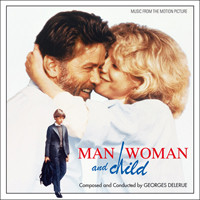- Composed by Georges Delerue
- Quartet Records / 2013 / 63m
A happily married American man with two daughters discovers that an affair he had some time ago while visiting France resulted in him having a son, whose mother has just died. Starring a bearded Martin Sheen and Blythe Danner (for the sake of clarity, I should point out that only Sheen has a beard – Danner is on this occasion clean-shaven), Man, Woman and Child was directed by Dick Richards and released to little acclaim in 1983.
A film about a young French boy moving to America was ripe territory for a composer who was an older Frenchman who had moved to America; though in truth, most films were ripe territory for the great Georges Delerue. Man, Woman and Child was a film that allowed him to express his trademark melancholy with great passion, though it only briefly allowed him the opportunity for more romantic exploration. His sumptuous score has never previously been released, beyond the main theme on compilations.
Said main theme is, of course, an absolute belter. It’s first heard on the album in an arrangement for tenor sax, sounding moody and sad, and that’s a great piece; but it is in the second cue, actually the main title, that it really comes into its own, the string arrangement filling the piece with anguish and longing. It’s just so beautiful, vintage Delerue. “The Kiss” is an elegant piece for string quartet, sounding for all the world like a piece of 18th century French classical music, but in fact absolutely a Delerue original. You go even further back, to the French renaissance, for “Intelligencia”, with its flute and harpsichord solos infused with a distinctly Baroque feel. “Flashback” sees the composer evoking his homeland with a jaunty accordion tune, playful and delightful. “Plaisir d’Amour” sees Delerue interpolate a piece by Jean Paul Égide Martini and it is utterly gorgeous.
The mood changes in “Bonjour Papa”, infused with a quite profound sense of sadness, a delicacy too which is tremendously moving. The theme dominates the coming portions of the score, heard in a slightly sunnier arrangement in “Driving Home”, then a tragic one in “Looks”. In a more slowly-paced arrangement in “Conversation” and then a subdued arrangement of the main theme in “The Picture”, the heart strings are tugged still further. A break into considerably sunnier territory comes in the wonderful “Trash to Chicken”, flowing with all the joys of life. “Mellow Margot” is a piece of light jazz source music, not at all out of place within the main body of the score.
“Clean the Table” beings with a lovely flute theme before a segue into a brief piano version of the sad theme, which reaches its zenith in the spectacular “I’m Your Father”, swelling into a happier, more optimistic arrangement. The optimism doesn’t last long though and the theme returns to its previous incarnation in both “Coffee” and the particularly anguished “To Airport”. The score concludes with the tearjerking “Au Revoir”, the sad theme being heard on piano just as it was when it was first introduced earlier in the score.
The album also contains several bonus tracks. The Edie Lehman-performed vocal version of the main theme, “Never Gone”, is pleasant enough though slightly let down by cloying lyrics; and there are alternative versions of a few cues along with some more source music, including “Disco Delerue”, whose title speaks for itself. Man, Woman and Child is a very fine score, powerfully emotional in a generally rather downbeat way yet completely listenable. Quartet’s fine album boasts excellent sound and liner notes by Tim Greiving.
Rating: ****
facebook.com/moviewave | twitter.com/MovieWaveDotNet | amazon.com













Right on the mark, James. As usual.